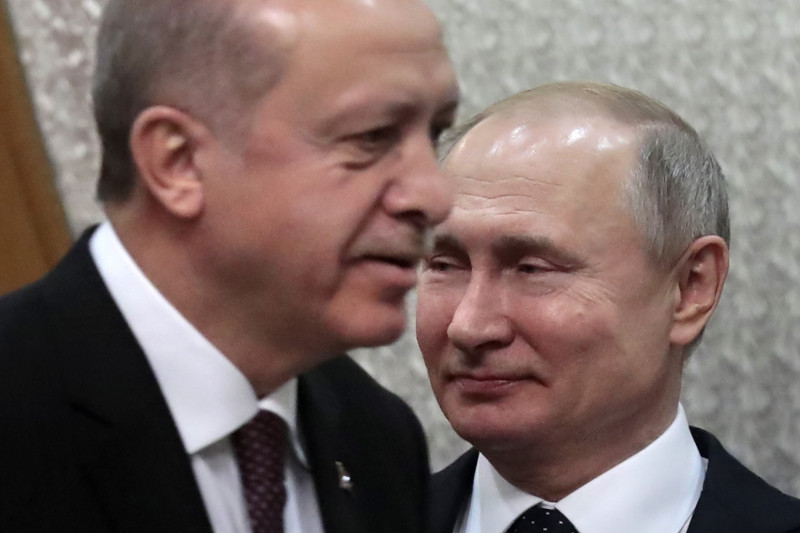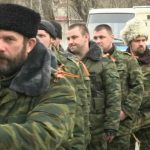Turkish President Recep Tayyip Erdogan’s balancing act of backing Ukraine while signalling that Russia remains important to his country is becoming increasingly difficult as he criticizes Vladimir Putin and yet continues to accommodate him.
The two leaders have a tense working relationship long described as a marriage of convenience, but it could be jeopardized by Mr. Erdogan’s support for Kyiv.
He has sold lethal drones to Ukraine, and Turkey has described the conflict as a war, triggering an international pact that prevents additional Russian warships from entering the Black Sea. Turkey voted Wednesday in favour of the United Nations General Assembly’s historic denunciation of Russia’s invasion of Ukraine. On the other hand, Turkey has not closed its airspace to Russia and will not impose sanctions against the regime.
Mr. Erdogan has also offered to mediate the crisis, and earlier this week said Turkey would not turn its back on either Ukraine or Russia. On Tuesday, he urged Ukraine and Russia to stop fighting and said Ankara was not opposed to NATO expansion – a key bone of contention for Mr. Putin.
Experts in Turkey have described Mr. Erdogan’s approach to Mr. Putin as walking a tightrope: showing full support for Ukraine while trying not to anger a powerful neighbour that could retaliate. The two countries have strong economic ties, with Turkey relying heavily on Russian fuel exports, tourism and trade. At the same time, Russia has long posed a threat, with historic fighting between the countries often resulting in Turkey losing territory.
:format(jpeg)/cloudfront-us-east-1.images.arcpublishing.com/tgam/MCQE2ZCYDNDX3OMPRIBPMZEFCI.JPG)
Many experts have said that if Russia becomes irritated by Turkey’s support for Ukraine, it could retaliate by bombing Idlib in Syria, which would send more Syrian refugees toward Turkey’s southern border. “Turkey has figured out over the centuries its approach to co-operating with Russia and to confronting it,” said Atlantic Council senior fellow and former U.S. ambassador to Azerbaijan Matthew Bryza, who is based in Istanbul.
Mr. Bryza said Turkey has tried to thread the needle on this issue and many others in the past, but it wasclear Ankara could no longer avoid calling the conflict a war and triggering the implementation of the Montreux Convention, which limits warships in the Black Sea.
Mr. Bryza pointed out that Mr. Erdogan reached out to Mr. Putin, explaining the situation, and Russia reportedly assented. “So a balancing act, constantly,” he said.
“He condemned the war. He condemned the annexation of Crimea. But he said those relations will continue on both sides,” Mr. Bryza added.
Turkey’s relationship with Ukraine is also important. Mr. Bryza said Turkey is Ukraine’s largest investor. He pointed out that not only has Ankara sold drones to its neighbour, the two countries have agreed to manufacture them in Ukraine. “Those are killing Russian soldiers … there are dead Russian soldiers because of Turkey’s co-operation with Ukraine, and there will be many more.”
:format(jpeg)/cloudfront-us-east-1.images.arcpublishing.com/tgam/S2DZPYNRENOELAZE7IKKRRYSVQ.JPG)
:format(jpeg)/cloudfront-us-east-1.images.arcpublishing.com/tgam/MTCUMTZ2EZLQVO5IJAQLKIYAIQ.JPG)
Turkey has traditionally balanced its relationships with the West and Russia, despite its membership in NATO, said Seckin Kostem, an assistant professor of international relations at Bilkent University in Ankara.
He said Turkey and Russia are connected by geography and economic ties, particularly on energy, and the Syrian conflict. But Turkey defines its relationship with Ukraine as strategic – the two signed a free trade agreement just last month – while its relationship with Russia is much different.
Prof. Kostem said Moscow has important economic leverage over Ankara, which is another key reason Turkey has to co-operate with its neighbour. “It’s a strange partnership. It looks like an unlikely partnership. A lot of them referred to it as a marriage of convenience … I call it an informal geopolitical alignment, but it’s definitely not a strategic partnership.”
He raised Turkey’s downing of a Russian jet in 2015, and then, in 2020, the killing of more than 30 Turkish soldiers in Idlib as a result of a joint Russian-Syrian air strike. “So it’s not a close co-ordination of military plans in Syria. It’s rather the two sides accommodate each other for pursuing their own military strategies,” he said.
He also pointed out that Russia and Turkey have usually been at odds in every geopolitical crisis from Syria to Libya, Crimea, Nagorno-Karabakh, Georgia and now the invasion of Ukraine.
“They do have close ties. But because they have to have close ties, this doesn’t mean they are allies or strategic partners. They’ve learned to have to co-operate in the past three decades. They share the same geography, so it’s been a tough learning process.”
STORY CONTINUES BELOW ADVERTISEMENTabout:blank
:format(jpeg)/cloudfront-us-east-1.images.arcpublishing.com/tgam/XKSDXKAXZZMZ7I3VBV56GNGYSA.JPG)
Turkey’s overtures to Russia have caused tension with the West. At the same time, Turkey has not always felt supported by NATO.
Mr. Bryza said Russia has also been playing it carefully with Ankara because Mr. Putin’s chief strategic goal when it comes to Turkey is splitting it away from NATO.
After the 2016 attempted coup in Turkey, Mr. Putin was the first foreign leader to call Mr. Erdogan.
Meanwhile, the Obama administration took days to condemn that coup, and U.S. secretary of state John Kerry said that if Mr. Erdogan had clamped down on the opposition, Turkey’s membership in NATO would have come under scrutiny.
Then, in 2017, Ankara’s multibillion-dollar purchase of a Russian missile system prompted the Trump administration to impose sanctions against Turkey.
However, Mr. Bryza said, “Russia’s attempt to pull Turkey away from NATO is now doomed,” as Ankara tilts toward Ukraine.
:format(jpeg)/cloudfront-us-east-1.images.arcpublishing.com/tgam/TW52OJENJJDJDHXNQUEGOKMC3Y.JPG)
What people often fail to understand when it comes to Turkey and Russia is the bloody history the two share, said Tallha Abdulrazaq, an expert and consultant on Middle Eastern military and strategic affairs. Several wars were fought between the Ottoman Empire and Imperial Russia between the 16th and 20th centuries, with the Ottomans losing much territory, he said.
“Such major historical events leave a sense of trauma that amplifies feelings of danger. This was perhaps best exemplified when Turkey shot down an encroaching Russian Su-24 in October, 2015. Ankara thought NATO would have its back against its nuclear-armed neighbour and it had strategic interests in Syria, so was hoping NATO would come in on its side.”
But “aside from lip service, the Turks were told they’d be on their own in any conflict with Russia.”
Dr.Abdulrazaq said the incident led to a humiliating climbdown for Mr. Erdogan, who apologized to the families of the deceased pilots as part of Mr. Putin’s conditions for normalizing their relationship in 2016.
He said preventing warships from entering the Turkish Straits will not change much, since Russia already has considerable naval power in the Black Sea. It is more symbolic, and the reasons are clear: “Erdogan doesn’t want to risk a repeat of 2015, where Turkey is left hung out to dry with an extremely angry and powerful neighbour to the north.”
“Turkey is still very much a part of NATO and desires strong ties with the West. But it won’t risk the Kremlin’s ire again without cast-iron guarantees that it will be supported and shows of good faith from the West in terms of Turkey’s national security and strategic interests in Syria, as well as energy politics in the Eastern Mediterranean.”
:format(jpeg)/cloudfront-us-east-1.images.arcpublishing.com/tgam/43ZZB5FRMBBDDKL5UH54YYLLHM.jpg)
If Russia does get angry over Turkey’s support for Ukraine, it might show in northern Syria. Soli Ozel, a lecturer at Kadir Has University in Istanbul, said Russia could respond by striking Idlib, sending refugees fleeing again.
“I do think that the response from Russia, if they want to really create trouble for Turkey, it would come from Syria,” he said.
Mensur Akgun, a lecturer at Istanbul Kultur University, said that while Russia is Turkey’s neighbour to the north, it is also a problem in the south because of its support for President Bashar al-Assad’s war in Syria.
“So there are complex set of relations with the Russians and they try to mediate between Ukraine and Russia and they try to calm down the Russians. But obviously they are reluctant to go beyond the restrictions of the Montreux Convention.”
He too said there would be significant consequences for Turkey and Europe if Russia were to attack Idlib, where four million people are squeezed into a small plot of land.
The consequences of this war in Ukraine are “enormous” economically and politically for Turkey, he said.
By: Janice Dickson
source: Globe & Mail



